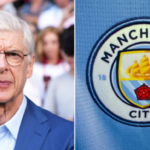Pep Guardiola Urged to Make Ruthless Man City Decision After Leverkusen Loss

Pep Guardiola walked into the Etihad Stadium with emotions written on his face as Manchester City prepared for another Champions League night, but nobody inside the stadium knew that this game would become one of the most painful chapters of his long European journey. It was supposed to be a night of celebration, a night to honour his 100th Champions League match in charge of Manchester City, a milestone only two other Premier League managers had ever reached before him, Sir Alex Ferguson and Arsène Wenger. The stage was ready, the lights were shining, the fans were singing, but what happened next left the entire stadium in silence. Instead of joy, instead of glory, instead of something to remember forever, the night transformed into regret, frustration and hard lessons that Guardiola himself described in one sentence that echoed across the football world: maybe it was too much.
Manchester City were expected to win. That was the story before kickoff. Bayer Leverkusen were delayed even before arriving in England due to luggage and travel issues, their squad was missing big senior players, and six players from their under-19 squad were on the bench. If anyone felt pressure, it should have been them, not Manchester City. But football does not follow logic all the time. Football follows energy, determination and decisions, and one decision changed everything before a ball was even kicked. Pep Guardiola made ten changes to the team that played against Newcastle in the Premier League. Only Nico Gonzalez remained from that lineup. Phil Foden, Erling Haaland, Rayan Cherki and other star players sat on the bench when the match started. Many expected City to still dominate because this is Manchester City, the defending European champions, the masters of possession, the team with one of the deepest squads in Europe. But sometimes depth is not enough, rhythm is not enough, and even talent is not enough when confidence is missing and chemistry is broken.
From the first few minutes it was obvious that City lacked their usual spark. The passes were slow, the movement was predictable and the players looked like strangers rather than teammates. The fans tried to support, but even they looked confused as Leverkusen grew stronger and stronger with every minute. In the 23rd minute everything changed. Bayer Leverkusen launched a fast counterattack. Christian Kofane made a perfect run and found Alejandro Grimaldo, the captain who didn’t think twice before striking the ball with his left foot. His shot flew past James Trafford, straight into the net, and suddenly the German players were running to the corner to celebrate while the Etihad froze in disbelief. Guardiola closed his eyes for a second. You could tell he knew the game had officially become complicated.
City tried to respond but the reaction was weak. Omar Marmoush fought hard up front but nothing worked. Oscar Bobb and Savinho tried to carry the ball down the wings but they were quickly isolated and blocked. The midfield could not build momentum, the defence looked stressed and Bayer Leverkusen waited like predators, always ready for the next counterattack. The longer the match continued, the more confident the German players became. The second half started and instead of a comeback from City, more punishment arrived. In the 54th minute Ibrahima Maza delivered a perfect cross and Patrik Schick rose highest to head the ball into the net. 2-0 to Bayer Leverkusen inside the Etihad Stadium. The away fans exploded with happiness. The home fans remained silent. Guardiola immediately looked to the bench and signaled for Haaland, but even the Norwegian goal machine could not rescue a game that had gone wrong long before he entered the pitch.
Manchester City pushed for a goal, but every shot was blocked, every dribble was stopped, every pass felt heavy and late. The players looked like they were playing not to make mistakes instead of playing to win. The fear of failure froze their creativity. Pep Guardiola kept shouting instructions, demanding pressing, demanding intensity, demanding courage, but his voice could not change the reality that the team had lost control of the match long before the substitutions arrived. Even with superstars on the pitch the energy remained flat. The final whistle came, and the only sound that filled the Etihad was the joyful singing of the Bayer Leverkusen supporters. Led by a drummer and a supporter with a microphone, the away end turned into a concert as the German players danced and celebrated their unforgettable victory. The emotional contrast was massive. For Leverkusen, it was a night to remember forever. For Manchester City, it was a night they wished never happened.
When Guardiola faced the media after the game, his words were honest and full of responsibility. He did not blame the players. He did not blame injuries. He did not blame luck. He blamed himself for the number of changes he made. He admitted that maybe he tried too hard to be fair to every player, maybe he rotated too aggressively, and maybe he forgot that football sometimes punishes kindness. He insisted that he wanted to keep the squad fresh for a long season full of matches every three or four days and no human can play everything. But he also knew that fans would ask why the strongest team did not start first and rotate later. He accepted the criticism with humility and even admitted that with the players who had been starting regularly in recent matches, confidence would have been higher. It was a tough moment for a manager who has given so much to the club and who has built a Champions League-winning team with his philosophy, discipline and trust.
While Guardiola took responsibility, Bayer Leverkusen’s manager Kasper Hjulmand praised his own team. He talked about the courage they played with, the calmness on the ball, and how proud he was of their character. He said this win was fuel for their growth. Even Jarell Quansah, the former Liverpool defender now representing the German side, described the night as unbelievable because so many senior players were absent, yet everyone stepped up with determination and grit. The contrast could not have been clearer. A team missing many starters played with unity and fire. A team filled with stars played without rhythm or belief.
One of the biggest questions after the match was about Manchester City’s lineup choices because this defeat has consequences. The loss means City now travel to the Santiago Bernabéu to face Real Madrid under pressure to get a result. A match that could have been a comfortable challenge has now turned into a battle for survival in the Champions League league phase. Guardiola admitted that Manchester City missed an incredible opportunity. That sentence alone explains how deeply he felt the loss. It was not only about losing a game. It was about losing control of the group, losing momentum, and losing a celebration that was supposed to elevate his 100th Champions League match into history.
Inside the stadium, some fans were left confused and disappointed. Many were not angry at the players but deeply surprised by the number of changes. The match was supposed to be a message to Europe that Manchester City were ready to defend their title again. Instead, it became a warning sign that pressure must now be handled carefully or things could become difficult quickly in the next stage of the season. Football is full of beautiful nights, but it is also full of nights that teach painful lessons, and Guardiola’s 100th Champions League match for Manchester City became one of those lessons.
Even analysts could not avoid reacting. Michael Brown, former City midfielder, questioned the decision to rotate so heavily. He said that many people would simply say the team should have won first and rested players later. He also admitted that such a heavily rotated lineup gave Bayer Leverkusen an emotional advantage. When they looked across the pitch and saw many key City players on the bench, belief started rising inside them. Football can change completely when belief enters one team and confusion enters the other.
This match did not erase everything Guardiola has achieved in Europe with Manchester City. He still built a club that won the Champions League, won the treble and became one of the most feared teams on the planet. But even the greatest coaches face nights where everything goes wrong. Even the biggest managers make decisions they later regret. Even the strongest teams can collapse when they lose identity. What matters now is the reaction. The defeat is written in the history. The emotions are already out there. What arrives next is the response against Real Madrid and the response in the Premier League when they face Leeds United.
The fans left the stadium with heavy hearts, but also with hope, because if there is one thing Manchester City under Guardiola has mastered, it is the art of rising after a painful fall. Champions are not defined by how they celebrate victories. Champions are defined by how they handle disappointment, criticism and mistakes. The next match will show whether this team is ready to remind Europe of who they are. Pep Guardiola did not hide. He stood in front of the cameras, took responsibility, and made it clear that he knows the expectations. Now the players must do the same when they step back on the pitch.
The defeat will remain a memory, but how City respond will decide whether it becomes a turning point or just a temporary stumbling block. The story is not finished. The Champions League journey continues. And after a night filled with regret and reflection, Manchester City now face the challenge of proving that one painful chapter cannot stop a team that has already written history and is ready to write more















